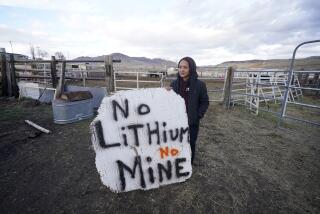One Legal Attack on Unocal Denied
- Share via
Unocal Corp. won a round in a long-running human rights case Friday when a Los Angeles judge ruled that 15 Myanmar refugees sued the wrong corporate entity -- at least under one theory -- for abuses they allegedly suffered at the hands of government soldiers guarding a company pipeline.
Los Angeles County Superior Court Judge Victoria Gerrard Chaney held that five subsidiaries -- not the parent company targeted in the case -- were responsible for Unocal’s share of the $1.2-billion natural-gas pipeline in the country formerly known as Burma.
By deciding that Unocal is not the “alter ego” of its subsidiaries, Chaney blocked one avenue by which the plaintiffs had hoped to take the parent company to trial. Still, the judge said she was not ruling out the possibility that El Segundo-based Unocal could face trial on other theories of liability.
“Unocal knew or should have known there were human rights abuses” in Myanmar, Chaney told a courtroom packed with Unocal lawyers and Myanmar activists opposed to the company’s investment in the Southeast Asian country.
Chaney said she found no evidence that Unocal had sought to shield itself from liability by concocting sham subsidiaries. Although the units shared employees, offices and bank accounts with the parent, she said, Unocal showed good faith in treating them as separate entities.
The subsidiaries kept their own business records and had enough cash and insurance to pay any judgment against them, she said. Unocal’s relationship to its subsidiaries mirrors that of many large, multinational companies, Chaney noted, “and this court is unwilling to initiate a sea change in the way the majority of corporations do business.”
Unocal lawyer Daniel Petrocelli said the ruling was the “beginning of the end of this case.”
He said the plaintiffs made a strategic error in suing the parent company, and the statute of limitations prevents them from refiling against the subsidiaries.
Petrocelli said he would argue that Chaney now must dismiss the suit against the parent.
This “represents a complete vindication for the men and women of a corporation that every trial court has found has done nothing wrong,” Petrocelli said.
Plaintiffs’ lawyer Dan Stormer said he was confident that the case, despite Friday’s setback, would go to a jury trial. He said Chaney had ruled earlier that the plaintiffs’ other theories of liability must be decided by a jury.
Stormer said jurors could hold Unocal liable if they determined its subsidiaries acted as agents of or were engaged in a joint venture with the parent. “We’re going to go forward under agency,” he said. “We’re going to go forward under joint venture.”
Stormer characterized the ruling as nothing more than a “bump in the road.”
“This is what happens in civil rights cases,” he said. “When you are trying to apply the law to people who historically have not had the benefit of the law, the cases become more difficult.”
The case stems from a pair of unprecedented lawsuits the plaintiffs filed in federal court in 1996, alleging that Unocal was liable for murder, rape and enslavement carried out by soldiers guarding the pipeline in which Myanmar’s ruling junta was a partner. The suits were refiled in state court three years ago after a federal court dismissed them.
In 2002, Chaney ruled in the state case that Unocal could be held indirectly liable under a variety of legal theories, one of which she eliminated Friday.
Friday’s ruling came after several days of testimony from Unocal employees and business experts in the first phase of the trial. Chaney set a hearing for Feb. 20 on a written version of her ruling and to decide how the case should proceed.
Three judges on the U.S. 9th Circuit Court of Appeals reinstated the federal suits two years ago. That decision is under review by a larger 9th Circuit panel. The circuit court could wait for guidance from the U.S. Supreme Court, which will hear arguments in another case this session about whether federal courts have jurisdiction over misconduct abroad.
More to Read
Inside the business of entertainment
The Wide Shot brings you news, analysis and insights on everything from streaming wars to production — and what it all means for the future.
You may occasionally receive promotional content from the Los Angeles Times.











